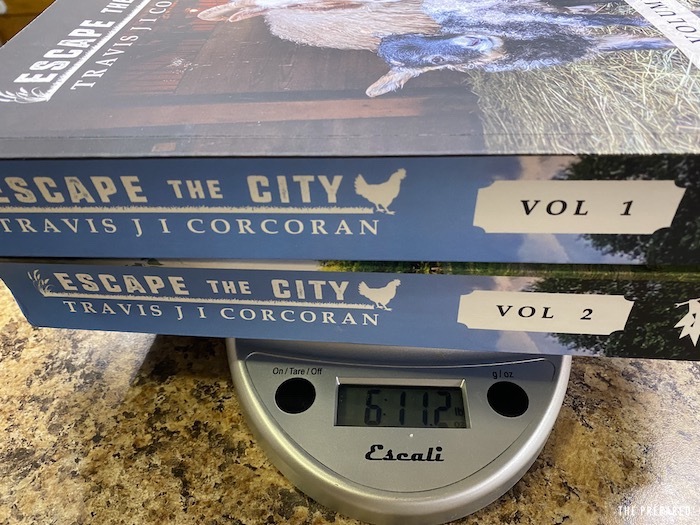A reader recently asked for a review of Travis J.I. Corcoran’s massive homesteading guide, Escape the City, and I joked that I’d need to get through the first 5 or 6 pounds. That wasn’t much of an exaggeration—these two volumes, which span over 1,200 pages and measure 8×10 inches, weigh more than six pounds. I’m mulling a review of Escape the City, but I have to get through the first 5-6 pounds or so. @theprepared — Josh Centers (@jcenters) July 22, 2021 After some controversial posts got him into trouble, Corcoran left Massachusetts a decade ago and settled on a 56-acre homestead in New Hampshire. When he's not writing award-winning science fiction or dismantling his neighbor’s illegal barn, he raises sheep and pigs, cuts firewood, brews beer, maintains orchards, builds shelves, grows crops, and does all the other tasks that come with rural living. When the pandemic pushed many people out of cities, Corcoran decided to compile his years of homesteading knowledge into a book—eventually resulting in two massive volumes. These aren’t just books; they’re encyclopedic guides filled with practical advice and hands-on techniques. I’ve wanted to review Escape the City since I backed it on Kickstarter. The challenge was how to do justice to such a monumental work. The table of contents alone is over 35 pages long, and the introduction even gives tips on how to read the pair. It’s clear this isn’t a casual read—it’s a comprehensive resource meant for those serious about homesteading. The content covers everything from adapting to country life, building infrastructure, raising and processing animals, managing vehicles, woodworking, and blacksmithing. And that’s just the tip of the iceberg. More: Pandemic panic in the city? A country boy on what to expect from rural life Summary: More: See Escape the City and other great titles in our recently updated guide to the best survival and prepper books Escape the City is part of a long tradition of homestead encyclopedias—massive books aimed at teaching everything you need to know about running a self-sufficient farm. Classics include John Seymour’s The Self-Sufficient Life and How to Live It, Back to Basics, and Carla Emery’s The Encyclopedia of Country Living. These books fall into two main categories: single-author guides and anthologies. I prefer the former because they tend to be more consistent and grounded in real experience. Corcoran’s work is no exception—he writes from the perspective of someone who has lived the homesteading life, not just written about it. Despite its thoroughness, Escape the City isn’t without flaws. It leans heavily toward industrial methods, using diesel, gasoline, and glyphosate. This contrasts with many organic homesteading guides. Corcoran also criticizes traditional homesteading philosophy, calling out idealism and theoretical thinking that lacks real-world application. He’s not afraid to speak bluntly, whether it’s about the risks of home distilling or the dangers of prepping without a financial safety net. His approach is practical, sometimes harsh, but always rooted in experience. With large reference works like Escape the City, formatting and usability matter. The paperbacks are like thick phonebooks—large, heavy, and packed with information. While the hardcovers are more durable, their weight and size make them less convenient for quick reference. The Kindle edition is helpful for searching, but the file size is unwieldy on smaller devices. The structure is similar to a wiki, with detailed sections and subsections. The table of contents is extensive, though occasionally off by a page or two. The index is computer-generated, which can lead to odd entries, but it still functions as a substitute for an ebook search feature. Corcoran includes QR codes throughout the book, linking to relevant websites. While these may become outdated, they’re hosted on his own site, making updates easier. The book also features detailed diagrams for projects like woodworking and canning, which are rare in many how-to guides. As a single-author encyclopedia, Escape the City has strengths and weaknesses. Some topics are missing entirely, while others are briefly touched upon. For example, there’s little on raising meat rabbits, and some sections are simply “I don’t have much experience with that.†But when it comes to tractors, welding, and workshop organization, the book shines. Corcoran offers practical advice on adapting to rural life, planning your move, and setting realistic goals. He also dives into economics, helping readers understand the costs of raising animals or growing crops. The book is especially strong on animal slaughter and butchering, with detailed instructions and warnings about potential pitfalls. While the book is dense and technical, it’s not devoid of charm. Corcoran touches on old-time skills like blacksmithing and scything, and even includes quirky tips like planning a Viking party. It’s a mix of practicality and personality. If you're interested in homesteading or DIY, this book belongs on your shelf. Especially if you're considering a move later in life, as Corcoran did at age 42. However, it’s not the only book you’ll need. If you lean toward organic methods or have a small plot, you might start with Carla Emery’s The Encyclopedia of Country Living or Ben Falk’s The Resilient Farm and Homestead. From a preparedness angle, I question how sustainable Corcoran’s methods would be in a post-collapse scenario. While his approach saves time and effort, it relies heavily on energy and supply chains. If those fail, his methods may not hold up. Still, for those ready to embrace modern tools and systems, Escape the City is an invaluable resource. Sofa Sets,sofa set for living room,recliner sofa set,leather sofa set Guangzhou LoPhiDa Co.Ltd , https://www.gzwidinlsa.com
Where Escape the City fits in the genre of homestead encyclopedias
The layout of the book
The actual content
Is Escape the City for you?
